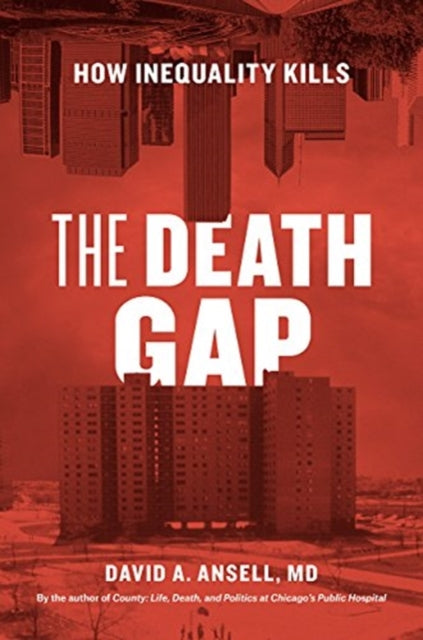David A Ansell MD
Death Gap: How Inequality Kills
Death Gap: How Inequality Kills
YOU SAVE £1.29
- Condition: Brand new
- UK Delivery times: Usually arrives within 2 - 3 working days
- UK Shipping: Fee starts at £2.39. Subject to product weight & dimension
Bulk ordering. Want 15 or more copies? Get a personalised quote and bigger discounts. Learn more about bulk orders.
Couldn't load pickup availability
- More about Death Gap: How Inequality Kills
The poor die sooner than the rich, and poor urban blacks die sooner than almost all other Americans. In The Death Gap, David A. Ansell, MD, gives a grim survey of these realities, drawn from observations and stories of his patients. He calls out the social and cultural arguments that have been raised to explain or excuse these gaps and lays bare the structural violence that is to blame. He outlines a vision that will provide the foundation for a healthier nation.
Format: Paperback / softback
Length: 240 pages
Publication date: 21 March 2019
Publisher: The University of Chicago Press
The widening income gap between the rich and the poor in America is a pressing issue that has garnered significant attention. However, when discussing the many things that the poor lack, their health often goes overlooked. This is particularly concerning as the poor are more likely to die earlier than their wealthier counterparts.
Blacks, in particular, face a higher mortality rate, and poor urban blacks experience even greater disparities. Dr. David A. Ansell, a doctor who has worked in hospitals serving some of the poorest communities in Chicago for nearly four decades, has witnessed firsthand the devastating consequences of these statistics.
In his book, "The Death Gap," Ansell provides a grim survey of these realities, drawing from observations and stories of his patients. While the contrasts and disparities among Chicago's communities are particularly stark, the death gap is a nationwide epidemic. There is a thirty-five-year difference in life expectancy between the healthiest and wealthiest American neighborhoods and the poorest and sickest ones.
This inequality is not inevitable, and Ansell challenges the social and cultural arguments that have been used to explain or excuse these gaps. He exposes the structural violence, including racism, economic exploitation, and discrimination, that is at the root of these disparities.
Ansell argues that inequality is a disease that needs to be treated and eradicated as we would any other major illness. To achieve this, he outlines a vision for a healthier nation that addresses the root causes of inequality.
One of the key aspects of Ansell's vision is the importance of addressing the social determinants health determinants, such as education, housing, and employment. He recognizes that these factors play a significant role in determining health outcomes and that addressing them can have a profound impact on reducing health disparities.
Ansell also emphasizes the need for healthcare reform that focuses on improving access to quality healthcare for all Americans, regardless of their income or social status. He argues that this will require a significant investment in public health infrastructure, such as hospitals, clinics, and community health centers, as well as policies that promote healthy behaviors and prevent chronic diseases.
In addition to addressing the social and economic determinants, Ansell calls for a cultural shift that values diversity and inclusivity. He argues that this will require a recognition of the importance of race, ethnicity, and culture in shaping health outcomes and that policies and practices that promote equity and justice will be necessary to achieve this.
Finally, Ansell emphasizes the importance of individual responsibility and empowerment. He argues that individuals must take control of their health and well-being by making healthy choices, accessing healthcare when needed, and advocating for policies that promote their health and well-being.
In conclusion, the widening income gap between the rich and the poor in America is a pressing issue that requires urgent attention. The poor are more likely to die earlier than their wealthier counterparts, and blacks, in particular, face significant disparities in mortality rates. Dr. David A. Ansell's book, "The Death Gap," provides a grim survey of these realities and challenges the social and cultural arguments that have been used to explain or excuse these gaps. He outlines a vision for a healthier nation that addresses the root causes of inequality, including social health determinants, healthcare reform, cultural shift, and individual responsibility and empowerment. By implementing these policies and practices, we can work towards creating a more equitable and just society where everyone has the opportunity to live a long and healthy life.
Weight: 364g
Dimension: 155 x 229 x 14 (mm)
ISBN-13: 9780226641669
This item can be found in:
UK and International shipping information
UK and International shipping information
UK Delivery and returns information:
- Delivery within 2 - 3 days when ordering in the UK.
- Shipping fee for UK customers from £2.39. Fully tracked shipping service available.
- Returns policy: Return within 30 days of receipt for full refund.
International deliveries:
Shulph Ink now ships to Australia, Belgium, Canada, France, Germany, Ireland, Italy, India, Luxembourg Saudi Arabia, Singapore, Spain, Netherlands, New Zealand, United Arab Emirates, United States of America.
- Delivery times: within 5 - 10 days for international orders.
- Shipping fee: charges vary for overseas orders. Only tracked services are available for most international orders. Some countries have untracked shipping options.
- Customs charges: If ordering to addresses outside the United Kingdom, you may or may not incur additional customs and duties fees during local delivery.


